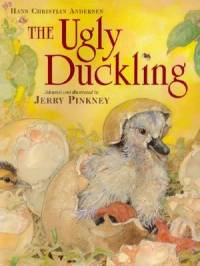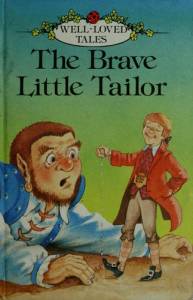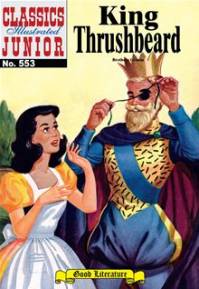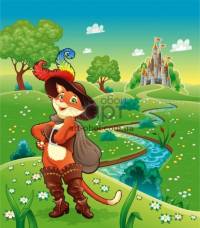Hans Christian Andersen.
It was a beautiful summer, the wheat was yellow, the
oats were green, and the hay was dry. From the old ruined house which nobody
lived in, down to the edge of the canal, was a forest of great burdocks. It was
under these burdocks that a duck had built herself a warm nest, and was sitting
all day on six pretty eggs. Five of them were white, but the sixth, which was
larger than the others, was of an ugly grey colour. The duck was always puzzled
about that egg, and how it came to be so different from the rest.
On the next day the weather was beautiful, and the sun shone brightly on the green burdock leaves, so the mother duck took her little ducklings down to the water, and jumped in with a splash. One after another the little ducklings jumped in. The water closed over their heads, but they came up again in an instant, and swam about quite prettily with their legs paddling under them as easily as possible, and the ugly duckling was also in the water swimming with them.
Charles Perrault
Once upon a time,
there lived a king and a queen, who had no children. They were so sorry about
having no children, that I cannot tell you how sorry they were. At last,
however, after many years, the Queen had a daughter.
The was a very fine christening for the baby Princess. The King and Queen
looked throughout the kingdom for fairies to be her godmothers, and they found
seven fairies. Each fairy godmother was to give the princess a gift, as was the
custom of fairies in those days. In this way, the Princess had all the
perfections imaginable.
After the christening ceremony was over, the whole party returned to the King’s
palace, where there was prepared a great feast for the seven fairy god-mothers.
There was placed before each one of them a magnificent case of gold, in which
were a spoon, knife, and fork, all of pure gold set with diamonds and rubies.
But as everyone was sitting down at the table, they saw come into the hall a
very old fairy, whom they had not invited, because she had not left the tower
where she lived for over fifty years, and she was believed to be either dead or
under an evil spell.
The King ordered could not give her a case of gold as the others had, because
they had only seven made for the seven fairies. The old Fairy felt insulted and
muttered some threats between her teeth. One of the young fairies who sat by
her, overheard how she grumbled; and, guessing that she might give the little
Princess an unlucky gift, went, as soon as they rose from table, and hid behind
the curtains, so that she might make the last wish for the little princess, and
use it to put right any evil that the old fairy might do with her magic spell.
In the meanwhile all the fairies began to give their gifts to the Princess. The
youngest wished that she should be the most beautiful person in the world; the
next, that she should have the intelligence of an angel; the third, that she
should have a wonderful grace in everything she did; the fourth, that she
should dance perfectly well; the fifth, that she should sing like a
nightingale; and the sixth, that she should play all kinds of music to the
utmost perfection.
The Leap-frog.
A Flea, a Grasshopper, and a Leap-frog once wanted to see which could jump highest; and they invited the whole world, and everybody else besides to come to see the festival. Three famous jumpers were they, as everyone would say, when they all met together in the room. "I will give my daughter to him who jumps highest,” exclaimed the King; "for a competition without a prize would not be so amusing.” The Flea was the first to step forward. He had exquisite manners, and bowed to the company on all sides; for he had noble blood, and was, moreover, accustomed to live close to human beings; and that makes a great difference. Then came the Grasshopper. He was considerably heavier, but he was well-mannered, and wore a green uniform, which he had by right of birth; he said, moreover, that he belonged to a very ancient Egyptian family. The fact was, he had been just brought out of the fields, and put in a cardboard box.. "I sing so well,” said he, "that sixteen native grasshoppers grew thin from sheer envy when they heard me. And that is how the Flea and the Grasshopper introduced themselves, and thought they were quite good enough to marry a Princess. The Leap-frog said nothing; but because he said nothing, people thought he was all the cleverer. ; and when the housedog snuffed at him with his nose, he decided the Leap-frog was of good family. The old councillor asserted that the Leap-frog was a prophet; for one could see on his back, if there would be a severe or mild winter.
Cinderella
ONCE there was a gentleman who married, for his second wife, the proudest and most haughty woman that was ever seen. She had been married before, and already had two daughters who were exactly like her in all things. He had likewise, by his first wife, a young daughter, but of unequalled goodness and sweetness of temper, which she took from her mother, who was the best creature in the world. This sweet little girl missed her mother, who had died, terribly much.
No sooner was the wedding ceremony over, than the new wife began to show herself in her true colours. She could not bear the goodness of the gentleman’s pretty girl, and especially as she made her own daughters appear the more horrid. She made her do the meanest jobs in the house: the girl scoured the dishes and tables, and scrubbed the step-mother’s bathroom, and those of her daughters; she slept in a little attic, upon a wretched straw bed, while her sisters lay upon beds with the softest pillows, in fine rooms, with floors covered with beautiful carpets, and walls on which hung looking-glasses so large that they might see themselves at their full length from head to foot.
The poor girl bore all patiently, and dared not tell her father, who would have been angry with her; for his new wife ruled him entirely. When the little girl had done her work, she used to go into the chimney corner, and sit down among cinders and ashes, which led her to be called Cinderwench; but the youngest step-daughter, who was not quite so rude and unkind as the eldest, called her Cinderella. However, Cinderella, even though she was dressed in rags, was a hundred times prettier than her sisters, though they were always dressed very richly.
It happened that
the King’s son gave a ball, and invited all finest gentlemen and ladies of the
city. Our young misses were also invited, for they were always to be seen at
fashionable parties. They were truly delighted at this invitation, and
wonderfully busy in choosing such gowns, petticoats, and head-dresses as might
suit them. This was a new trouble to Cinderella; for it was she who washed and
ironed her sisters’ clothes and got all their things ready. Meanwhile, the
sisters talked all day long of nothing but what they should wear to the ball.
Brothers Grimm
One summer’s
morning a little tailor was sitting on his table by the window; he was in good
spirits, and sewed with all his might. Then came a peasant woman down the
street crying: ‘Good jams, cheap! Good jams, cheap!’ This rang pleasantly in
the tailor’s ears; he stretched his delicate head out of the window, and
called: ‘Come up here, dear woman; here you will get rid of your goods.’ The
woman came up the three steps to the tailor with her heavy basket, and he made
her unpack all the pots for him. He inspected each one, lifted it up, put his
nose to it, and at length said: ‘The jam seems to me to be good. I’ll buy a
jar.” The women, who had hoped to sell far more jam, gave him what he wanted
but went away grumbling.
‘Now, this jam
shall be blessed by God,’ cried the little tailor, ‘and give me health and
strength’; so he brought the bread out of the cupboard, cut himself a piece
right across the loaf and spread the jam over it. ‘This won’t taste bitter,’
said he, ‘but I will just finish the jacket before I take a bite.’ He laid the
bread near him, sewed on, and in his joy, made bigger and bigger stitches. In
the meantime the smell of the sweet jam rose to where the flies were sitting in
great numbers, and they were attracted and descended on it in hosts. ‘Hey! who
invited you?’ said the little tailor, and drove the unbidden guests away. The
flies, however, understood no German, and came back again in ever-increasing
companies. The little tailor at last lost all patience, and drew a piece of
cloth from the hole under his work-table, and saying: ‘Wait, and I will give it
to you,’ struck it mercilessly on them. When he drew it away and counted, there
lay before him no fewer than seven flies, dead and with legs stretched out.
The taylor looked
at the flies that he had killed, and could not help admiring his own bravery.
‘The whole town shall know of this!’ he said. And the little tailor hastened to
cut himself a belt, stitched it, and embroidered on it in large letters: ‘Seven
dead at one stroke!’ ‘What, the town, the whole world shall hear of it!’ he
exclaimed. and his heart wagged with joy like a lamb’s tail. The tailor put on
the girdle, and resolved to go forth into the world, because he thought his
workshop was too small for his valour. Before he went away, he looked around
the house to see if there was anything which he could take with him; however,
he found nothing but an old cheese, and that he put in his pocket. In front of
the door he observed a bird which had caught itself in the thicket. It had to
go into his pocket with the cheese. Now he took to the road boldly, and as he
was light and nimble, he felt no tiredness. The road led him up a mountain, and
when he had reached the highest point of it, there sat a powerful giant looking
peacefully about him. The little tailor went bravely up, spoke to him, and
said: ‘Good day, comrade, so you are sitting there overlooking the wide-spread
world! I am just on my way there, and want to try my luck. How about you come
with me?’ The giant looked contemptuously at the tailor, and said: ‘You wretch!
You miserable creature!’
King Thrushbeard
A king had a daughter who was beautiful beyond all measure, but so proud and haughty that no suitor was good enough for her. She sent away one after the other, and ridiculed them as well. Once the king made a great feast and invited, from far and near, all the young men likely to marry. They were all marshaled in a row according to their rank and standing. First came the kings, then the grand-dukes, then the princes, the earls, the barons, and the gentry. Then the king’s daughter was led through the ranks, but to each one she had some objection to make. One was too fat, the wine-barrel, she said. Another was too tall, and long and thin has little in. The third was too short, and short and thick is never quick. The fourth was too pale, as pale as death. The fifth too red, a fighting cock. The sixth was not straight enough, a green log dried behind the stove.
So she had something to say against each one, but she made herself especially merry over a good king who stood quite high up in the row, and whose chin had grown a little crooked. Look, she cried and laughed, he has a chin like a thrush’s beak. And from that time he got the name of King Thrushbeard. But the old king, when he saw that his daughter did nothing but mock the people, and despised all the suitors who were gathered there, was very angry, and swore that she should have for her husband the very first beggar that came to his doors. A few days afterwards a fiddler came and sang beneath the windows, trying to earn a few pennies. When the king heard him he said, let him come up. So the fiddler came in, in his dirty, ragged clothes, and sang before the king and his daughter, and when he had ended he asked for a trifling gift. The king said, your song has pleased me so well that I will give you my daughter there, to wife. The king’s daughter shuddered, but the king said, I have taken an oath to give you to the very first beggar-man and I will keep it. All she could say was in vain. The priest was brought, and she had to let herself be wedded to the fiddler on the spot. When that was done the king said, now it is not proper for you, a beggar-woman, to stay any longer in my palace, you may just go away with your husband.
The beggar-man led
her out by the hand, and she was obliged to walk away on foot with him. When
they came to a large forest she asked, to whom does that beautiful forest
belong.
Puss in boots
Once upon a time there was a poor miller who had three sons. The years went by and the miller died, leaving nothing but his mill, his donkey, and a cat. The eldest son took the mill, the second-born son rode off on the donkey, and the youngest son inherited the cat .
"Oh, well”, said the youngest son, "I’ll eat this cat, and make some mittens out of his fur. Then I will have nothing left in the world and shall die of hunger.”
The Cat was listening to his master complain like this, but he pretended not to have heard anything. Instead, he put on a serious face and said:
"Do not look so sad, master. Just give me a bag and a pair of boots, and I will show you that you did not receive such a poor inheritance in me.”
The Cat’s master had often seen him play a great many cunning tricks to catch rats and mice, as when he used to hang by the heels, or hide himself in the grain, and pretend to be dead; Thinking this over, he thought that it wasn’t impossible that the cat could help him after all. And so he gave the cat his bag and spent his last pennies on ordering a fine pair of boots to be made especially for the cat.
The cat looked very gallant in his boots, and putting his bag around his neck, he held the strings of it in his two forepaws and lay by a rabbit warren which was home to a great many rabbits
He put bran and corn into his bag, and stretching as if he were dead, he waited for some young rabbits, still not acquainted with the deceits of the world, to come and rummage in his bag for the bran and corn.
Not long after he lay down, he had what he wanted. A rash and foolish young rabbit jumped into his bag, and Monsieur Puss, immediately drew close the strings and caught him. Proud of his prey, he went with it to the palace and asked to speak with his majesty. He was shown upstairs into the King’s apartment, and, making a low bow, said to him:
I have brought you, sir, and a rabbit of the warren, which my noble lord the Marquis of Carabas ”(for that was the title which puss was pleased to give his master)" has commanded me to present to your majesty from him.”
"Tell thy master,” said the king, "that I thank him and that he does me a great deal of pleasure.”
Another time he went and hid himself among a corn field, holding still his bag open, and when a brace of partridges ran into it he drew the strings and so caught them both. He went and made a present of these to the king, as he had done before of the rabbit. The king, in like manner, received the partridges with great pleasure, and ordered him some money for drink.
In this way, the Cat continued for two or three months to bring presents to the king, always saying that they were from his master, the Marquis of Carabas. One day in particular, he heard at the palace that the King was planning to drive in his carriage along the river-bank, taking with him his daughter, the most beautiful princess in the world. Puss in Boots said to his master.
"If you will follow my advice your fortune is made. You have nothing else to do but go and wash yourself in the river, in the place that I shall show you, and leave the rest to me.”
The miller’s son did what the Cat advised him to, without knowing why or wherefore. While he was washing the King passed by, and the Cat began to cry out:
"Help! help! My Lord Marquis of Carabas is going to be drowned.”
At this noise the King put his head out of the coach- window, and, finding it was the Cat who had so often brought him such good game, he commanded his guards to run immediately to the assistance of his Lordship the Marquis of Carabas. While they were drawing the poor Marquis out of the river, the Cat came up to the coach and told the King that, while his master was washing, there came by some rogues, who went off with his clothes, though he had cried out: "Thieves! thieves!” several times, as loud as he could.
This cunning Cat had hidden the clothes under a great stone. The King immediately commanded the officers of his wardrobe to run and fetch one of his best suits for the Lord Marquis of Carabas.
The King was very pleased to meet the Marquis of Carabas, and the fine clothes he had given him suited him extremely well, for although poor, he was a handsome and well built fellow. The King’s daughter took a secret inclination to him, and the Marquis of Carabas had no sooner cast two or three respectful and somewhat tender glances but she fell in love with him to distraction. The King invited him to sit in the coach and ride along with them, with the lifeguards in glittering uniform trotting along side. The Cat, quite overjoyed to see his project begin to succeed, marched on before, and, meeting with some countrymen, who were mowing a meadow, he said to them:
"Good people, you who are mowing, if you do not tell the King that the meadow you mow belongs to my Lord Marquis of Carabas, those soldiers will chop you up like herbs for the pot.”
The King did not fail asking of the mowers to whom the meadow they were mowing belonged.
"To my Lord Marquis of Carabas,” answered they altogether, for the Cat’s threats had made them terribly afraid.
"You see, sir,” said the Marquis, "this is a meadow which never fails to yield a plentiful harvest every year.”
The Master Cat, who went still on before, met with some reapers, and said to them:
"Good people, you who are reaping, if you do not tell the King that all this corn belongs to the Marquis of Carabas, you shall be chopped up like herbs for the pot.”
The King, who passed by a moment after, wished to know to whom all that corn, which he then saw, did belong.
"To my Lord Marquis of Carabas,” replied the reapers, and the King was very well pleased with it, as well as the Marquis, whom he congratulated.
Then the King said, "Let us now go to your castle.”
The miller’s son, not knowing what to reply, looked at puss who said: "If your Majesty will but wait an hour, I will go on before and order the castle to be made ready for you. ”
With that she jumped away and went to the castle of a great ogre and asked to see him saying he could not pass so near his home without having the honor of paying his respects to him.
The ogre received him as civilly as an ogre could do, and made him sit down.
"I have been assured,” said the Cat, "that you have the gift of being able to change yourself into all sorts of creatures as you wish; you can, for example, transform yourself into a lion, or elephant, and the like.”
"That is true,” answered the ogre very briskly; "and to convince you, you shall see me now become a lion.”
Puss was so terrified at the sight of a lion so near him that he immediately climbed up the curtains, not without difficulty, because his boots were no use to him for climbing. A little while after, when Puss saw that the ogre had resumed his natural form, he came down, and admitted he had been very much frightened.
"However,” said the cat, "I fear that you will not be able to save yourself even in the form of a lion, for the king is coming with his army and means to destroy you.”
The ogre looked out of the window and saw the king waiting outswide with his soliders, and said,
"What shall I do? How shall I save msyelf?”
Puss replied: "If you can also change yourself into something very small, then you can hide”.
And in an instant, the ogre himself into a mouse, and began to run about the floor. Puss no sooner saw this but he fell upon him and ate him up.
Puss, who heard the noise of his Majesty’s coach running over the draw-bridge, ran out, and said to the King:
"Your Majesty is welcome to this castle of my Lord Marquis of Carabas.”
"What! My Lord Marquis,” cried the King, "and does this castle also belong to you? There can be nothing finer than this court and all the stately buildings which surround it; let us go into it, if you please.”
The Marquis gave his hand to the Princess, and followed the King, who went first. They passed into a spacious hall, where they found a magnificent rum punch, which the ogre had prepared for his friends, who were that very day to visit him. The friends, however dared not to enter, knowing that the King was there. His Majesty was perfectly charmed with the good qualities of my Lord Marquis of Carabas, as was his daughter, who had fallen violently in love with him, and, seeing the vast estate he possessed, said to him, after having drunk five or six glasses:
"If you do not, my Lord Marquis, become my son in law, it will be of your own choosing.”
The Marquis, making several low bows, accepted the honor which his Majesty conferred upon him, and forthwith, that very same day, married the Princess.
Puss became a great lord, and never ran after mice any more, except for pleasure.








